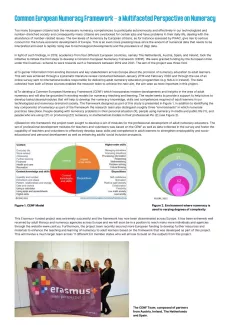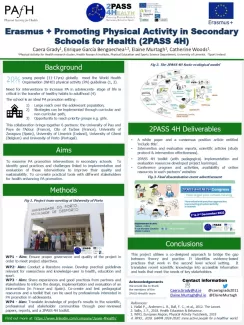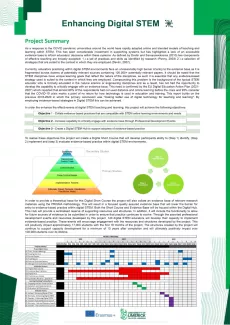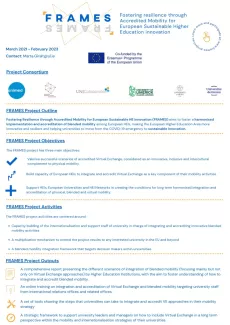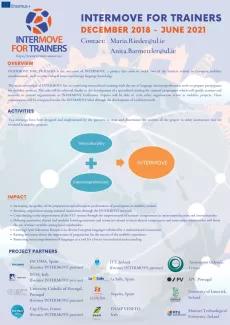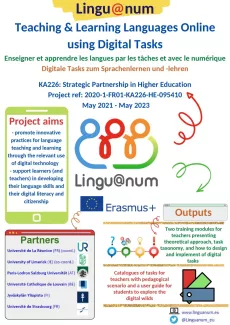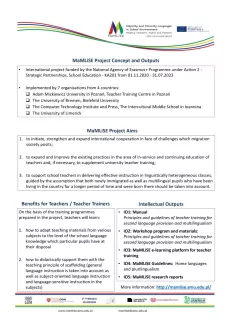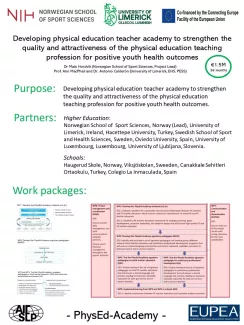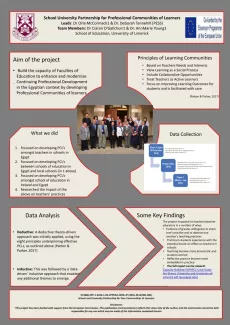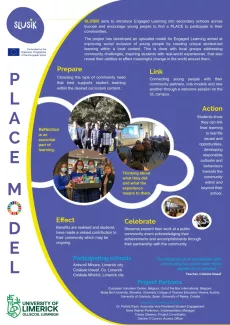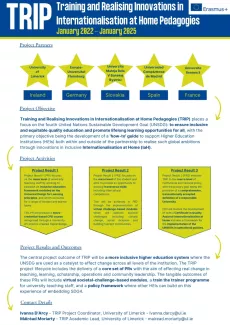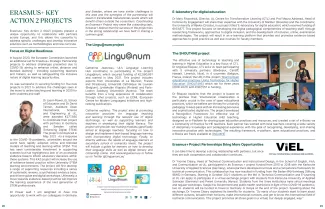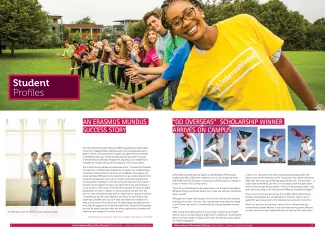Erasmus+ is the EU programme in the fields of education, training, youth and sport for the period 2021 - 2027. Education, training, youth and sport are key areas that support citizens in their personal and professional development. High quality, inclusive education and training, as well as informal and non-formal learning, ultimately equips young people and participants of all ages with the qualifications and skills needed for their meaningful participation in democratic society, their degree of intercultural understanding and their successful transition into the labour market.
The Erasmus+ Programme 2021 - 2027 manages more than 26 billion euros in funding to be distributed by the European Commission, the European Education and Culture Executive Agency (EACEA), and Erasmus+ National Agencies to support activities across the Programme's 3 Key Actions, including providing financial assistance for approved Erasmus+ projects.
The Erasmus+ Programme 2021 - 2027 comprises 3 Key Actions, with Key Action 2: Cooperation among organisations and institutions, and Key Action 3: Support to policy development and cooperation constituting the project elements of the Programme.
An additional Action, the Jean Monnet Actions, offer opportunities within the field of Higher Education and other educational and training fields to develop activities which contribute to knowledge dissemination regarding European Union integration matters.
Details regarding the different actions included under the umbrella of the Erasmus+ Programme 2021 - 2027 are available to view in the Erasmus+ Programme Guide, with information about the aims and objectives of different sub-actions, eligibility requirements and the process for submitting a project application.
The EU Commission Funding and Tender Opportunities Portal can be accessed here: https://ec.europa.eu/info/funding-tenders/opportunities/portal/screen/home, where the Commission and its funding bodies publish calls for various proposals, including those designated under Key Action 2, Key Action 3, and Jean Monnet.
In addition, the EU Commission also operates a Partner Search database, accessible here: https://ec.europa.eu/info/funding-tenders/opportunities/portal/screen/how-to-participate/partner-search, on which individuals or organisations can promote their project with the aim of attracting other institutions to join them in their work.
Any UL academic or support staff who has been asked to partner with other institutions/enterprises as part of an Erasmus+ project, or who have an idea for a new Erasmus+ project which requires further development, please contact ErasmusProjects@ul.ie for further information and support.
Coordinated Erasmus+ Projects:
Summary:
As a response to the COVID pandemic universities around the world have rapidly adopted online and blended models of teaching and learning within STEM. This has seen considerable investment in supporting systems but has highlighted a lack of an accessible evidence base to inform educators' decisions within these systems. As defined by Devlin and Samarawickrema (2010) two components of effective teaching are broadly accepted; 1.) a set of practices and skills as identified by research (Penny, 2003) 2.) a selection of strategies that are suited to the context in which they are employed (Devlin, 2007). Currently, educators practicing within digital STEM environments face an unreasonably high barrier of entry to the evidence base as it is fragmented across dozens of potentially relevant sources containing 100,000+ potentially relevant papers. It should be noted that the STEM disciplines have unique learning goals that reflect the nature of the disciplines, as such it is essential that any evidence-based strategy used is suited to the context in which they are employed. Compounding this problem is the background of the typical STEM educator who is formally educated in the natural science or engineering disciplines and as a result, has not had the opportunity to develop the capability to critically engage with an evidence base. This need is confirmed by the EU Digital Education Action Plan (2021-2027) which reported that almost 60% of the respondents had not used distance and online learning before the crisis and 95% consider that the COVID-19 crisis marks a point of no return for how technology is used in education and training. This report builds on the previous 2018-2020 in which the primary conclusion was "making better use of digital technology for teaching and learning". By employing evidence-based strategies in Digital STEM this can be achieved.
In order the enhance the effectiveness of digital STEM teaching and learning this project will achieve the following objectives:
Objective 1 - Collate evidence-based practices that are compatible with STEM online learning environments and needs
Objective 2 - Increase capability to critically engage with evidence base through Professional Development Events
Objective 3 - Create a Digital STEM Hub to support adopters of evidence-based practice
To realise these objectives this project will create a Digital Short Course that will develop participants ability to identify, implement and evaluate evidence-based practice within digital STEM environments. In order to provide a theoretical base for this Digital Short Course the project will also collate an evidence base of relevant research materials using the PRISMA methodology. This will result in a focused quality assured evidence base that will lower the barrier for entry to evidence-based practice within digital STEM. Both the Short Course and Evidence Base will be housed within the Digital Hub. This Hub will provide a centralised reserve of supporting resources and structures. In addition, it will include the functionality to allow for future sources of evidence to be submitted in order to ensure that practice continues to evolve.
Through the assorted professional development events and resources developed by this project, 140 digital STEM educators will develop their capacity to implement evidence-based practice. These events will encourage engagement with the resources and structures developed by the project. This will positively impact approximately 17,000 students with the first 18 months of the project. The structures created by the project will continue to support capacity development for a minimum of 10 years after completion and will ultimately positively impact over 100,000 students over its lifetime.
Project Number: 2020-1-IE02-KA226-HE-000765
Duration: 01/05/2021 - 31/04/2023
Consortium:
- University of Limerick (Coo)
- Chalmers University of Technology
- Advanced Mining technologies
- RWTH Aachen University
Summary:
Between accelerating technological advancement and the societal and environmental challenges we face, the next decade will transform the way we live, learn and work. Such advancements are disrupting labour markets, altering our social fabric, and the future of work. The World Economic Forum contends that whilst there is a continuing need for sector-specific skills, increased importance is placed on cross-sectoral skills with the prospect that only 40% of the jobs that exist today, will exist in the future. The crisis triggered by Covid19 has accelerated these changes. To successfully navigate this time of uncertainty, we need strategies that support the development of resilience, imagination, and adaptation as key characteristics and the digital competencies required to support this transition. The high-level objective of EULab is to co-design and build a pan European blended exchange programme delivered through a series of ‘Futures Labs,’ that will enable active global citizenship, using a digitally enabled heutagogical instructional design. EULab is the name for the strategic partnerships between the University of Limerick, Audencia Business School, Oulu University Business School and Universidad de León. The aim is to extend the educational offering of VE programmes to include heutagogical challenge-based approach in a studio learning environment. The objectives of EULab include: the development and refinement of a ‘Futures Lab’ methodology; the development of the competences of learners and educators to operate and lead in this environment; and the influence of policy in the area of virtual exchange to incorporate a more active, design-based modality. EULab therefore includes, ‘Futures labs’; train the trainer CPD training including a toolkit and a digital working environment to support students and faculty. Futures Lab is the descriptive name for the type of learning space and content that the EULab partnership will support. Key characteristics include: a design studio-based learning environment; development of self-determined learning and intervention in real world problems. Participants include 100+ learners and 24+ faculty from the partner institutions. Both undergraduate and postgraduate learners will be recruited from across the four partner institutions. EULab comprises a number of key activities including: test and implement innovative practices in the field of Higher Education (HE), with activities to deploy digital tools and methods to deliver quality and inclusive education through online/virtual means, including blended teaching, training and learning; and activities to support learners, teachers, and trainers in adapting to online teaching and learning. EULabs are built around the United Nations Sustainable Development Goals (SDG) framework, and will enable cross-cultural, cross-disciplinary collaboration to address complex real-world problems. This proposal is built around two foundational innovative approaches. HEUTAGOGY: While pedagogy and andragogy are teacher-led approaches, where instructor determines what, how, when and where learning takes place, heutagogy is a self-determined instructional strategy that emphasises the development of autonomy and capability to self-determine learning. Learners are regarded as problem finders; they know how to find and set their destination and become increasingly independent (Hase & Kenyon, 2013). COSMOLOCAL: EULab is built on the notion of cosmo-local, described as a circular system of knowledge which involves; 1) the sharing of knowledge across national, sectoral, and disciplinary boundaries, 2) testing these in the local setting and 3) sharing the learnings from these settings (Waddock, 2020). EULab will help to achieve this and thus answers the call for EU universities to do more in address the UN SDGs. Building on its transnational partnership EULab will work towards the development of a platform to support its partners as well as working to influence policy on the role of a heutagogical virtual exchange programme as part of the EU Erasmus+ suite of activities. The aim being to create the conditions in which the proposed community of practice can thrive and drive forward the EU’s HE sectors response to the SDGs.Building on the DigCompEdu, the EULab strategic partnership will result in the development of digitally competent, future-facing, and active citizens. It is both innovate in delivery and approach and will increase our institutions’ on-going capacity to anticipate, understand and respond to emerging skills needs of enterprise and society more broadly. Following the completion of this proposal EULab’s ultimate ambition is to grow the network beyond the initial four partner organisations. EULab has the potential to deliver scalable digital mobility across the EU and develop widespread capacity amongst HE institutions to deliver on the ambitions of the UN SDGs.
Project Number: 2020-1-IE02-KA226-HE-000787
Dates: 01/04/2021 – 31/09/2023
Consortium:
- University of Limerick (Coo)
- Audencia
- Oulun Yliopisto
- Universidad de Leon
Website: https://www.eulab.org/
Summary:
Background:
Higher education has a critical role to play in the global quest to address the societal challenges that underpin the United Nations Sustainability Development Goals (SDGs) through innovations in teaching, learning, scholarship, operations and community leadership. The TRIP project aims to exemplify through a focus on SDG 4: To ensure inclusive and equitable quality education and promote lifelong opportunities for learning for all with a ‘how to guide’ to support higher education institutions within the partnership and beyond to realise such global ambitions through innovations in inclusive internationalisation at home.
Internationalisation at Home is to be understood here as “the purposeful integration of international and intercultural dimensions into the formal and informal curriculum for all students within domestic learning environments” (Beelen & Jones 2015, p.69), is increasingly becoming a key strategic priority for higher education across the globe. Yet, it is recognised within the literature that there is “no recognized strategy, formula or approach” (Robson et al., 2017, p.20) to IaH which establishes the need for collective efforts of key stakeholders from the level of national and international policy makers to that of the individual students.
While a number of previous funded projects have focused on these levels individually, the aim of this project is to bridge the gap that exists in taking a full 360 degree approach to robust and innovative Internationalisation at Home. The TRIP project will address this existing gap by developing a framework to embed a quality assured Internationalisation at Home model focused on a tripartite action model addressing:
(i) macro (Institutional level & Societal Level) , (ii) meso (Curriculum enhancements and teaching innovations) and (iii) micro levels (Inclusion of all students).
We see this as working in tandem with the need for actionable measures that can be operationalised transnationally as indicators of quality IaH linked to the EU priorities of making higher education systems inclusive and connected to society with the SDGs as catalyst to address this gap, with our own focus on SDG 4.We align ourselves with Brandenburg (2020) who promotes the concept of “internationalisation in higher education for society” (IHES) by defining it as “… to benefit the wider community, at home or abroad, through international or intercultural education, research, service and engagement…” (p. 12)
A focus on the SDGs enables higher education to look inward to address inequalities in access to education and opportunities to engage fully with education programmes. For example, students from refugee backgrounds are often unable to engage in mobility and what we are proposing in PR2 would enable such students to make-use of their skill set cross institutionally through our innovative virtual modules. In addition, using the SDGs as a catalyst to enable higher education to look externally to help governments and business and civil society to chart pathways to sustainable development. TRIP will also enable a civic and community engaged education to flourish. Our belief is that COVID 19 pandemic has shown higher education to be flexible and agile and we need to build on the capacity to find creative and innovative solutions to provide education through globally engaged civic institutions.
Objectives:
The priority focus for this project is in building an inclusive higher education system. In training and realising innovations in Internationalisation at Home pedagogies (TRIP) we aim to build robust frameworks and systems to up-skill staff and students to become more inclusive and to hold institutions accountable through a quality assured process which enables purposeful engagement with the UNSDGs. The global benefit of such an approach reflects our commitment to ensuring that higher education produce globally engaged graduates who are capable of working interculturally to solve problems of global significance. Here, we focus on ideas of global citizenship as a frame for raising awareness of global societal challenges and enabling participation in creative solutions through an IaH based module that allows students in engage in virtual mobility. Also, in line with the European University Association’s mission, our goal is to advance the ethos of ‘university without walls’, by ensuring that higher education provides effective mechanisms for the design and delivery of curricula that are on the one hand, inclusive and providing means to access transversal skills (e.g. intercultural competence and global citizenship) while on the other hand, are underpinned by the commitment of higher education to address key societal challenges. Our approach explicitly recognises the importance of interdependencies between and within the SDGs and key pillars underpinned by the European Commission including, but not limited to Sustainability; Diversity and Inclusion, Civil Society, Digital Capacity and Widening participation. We are keen to move away from a process where the UN SDGs are evoked in a time of sustainability washing and provide a framework for effective operationalisation centred around the SDG4: Ensure inclusive and equitable quality education and promote lifelong learning opportunities for all.
TRIP focuses on three project results which are built around mapping, building capacity, embedding, evaluating and quality assuring a SDG4 indexed approach to inclusive internationalisation. Each project result takes a levelled focus. In promoting an internationalisation for everyone approach through our focus on a tripartite model, the macro levels of the national policy, the institutional level of benchmarking, the faculty of level of teaching to the micro level of the student population. The following outlines our approach in detail:
This vision is underpinned by a number of concrete objectives:
To build capacity amongst teaching staff to develop their curricula in line with the inclusive education pedagogy,
To build capacity through a train the trainer and a phased approach to the addition of partners and themes across the lifecycle of the project,
To map the extent to which Universal Design for learning is a good fit for enhancing inclusive learning and classroom settings (both in person and virtually),
To develop students globally engaged citizens through SDG indexed community-based modules,
To enhance students transversal skills through engaging in transnational virtual modules with a specific focus on language and intercultural competencies,
To deconstruct the artificial boundary between domestic and international student and institution and local community through community engaged teaching,
To build inclusive internationalisation champions, Address systems thinking with respect to the mapping on the SDGs to University strategic planning,
To develop a quality assured framework through a Certificate in Quality Assured Inclusive Internationalisation at home, and to
provide a map to higher education to implement the principles of SDGS through operational and strategic policies.
Activities:
Project Result 1 (PR1) focuses on the meso level of university teaching staff through engagement in a development programme for enhanced pedagogy and curricula design. Working to establish a framework for inclusive education which accounts for the range of student types e.g domestic or international and also on learner types is one of the key goals of this project. Project Result 1: We will address this through the development and promotion of an innovative modelling of the Universal Design for Learning framework on to a culturally responsive teaching framework . This PR will produce a micro-credential based CPD course recognised through a digital badge created by the University of Limerick.
Project Result 2 (PR2) focuses on the micro level of the student and aims to provide an opportunity for the acquisition of transversal skills including intercultural competence. This will be achieved through virtual challenged based modules, which across of the lifecycle of the project will address on number of societal challenges including environment, social inclusion and building tolerant communities. PR2 will empower and mobilise students and given the virtual nature, provides an opportunity for all students to engage in mobility.PR2 will take an annual add-on approach where new student groups across UG, PG, PhD cohorts to access students to international students in host universities. Thereby honouring our commitment to provide accessible, affordable and inclusive education.
Project Result 3 (PR3) brings the project up to the macro level of institutional and national policy. The core goal of PR3 is to provide a comprehensive, transnationally accepted definition of a responsible University. In PR3 we will develop and test a Certificate in Quality Assured Internationalisation at Home with the aim of providing a toolkit for others to follow. PR3 will also directly develop a framework for the implementation of the principles of the SDGS in to operational policies.
Impact:
The core project outcome of TRIP is to propose an effective and efficient manner in which a more inclusive higher education system can be developed where the SDGs are used as a catalyst to effect change across all levels of the institution. We achieve this through a focus on SDG4 quality education using inclusive internationalisation at home as our lens.
The life-cycle of the TRIP project includes the delivery of a core set of project result types which address the three levels of our tripartite model with the aim of effecting real change in teaching, learning, scholarship , operations and community leadership.
At the micro-level of the individual student which is the focus of PR2 the tangible outcomes will include (i) a virtual module which is societal challenge focused (ii) development of transversal skills through their engagement in transnational and multilingual teams (iii) a training manual will provide opportunities for other higher education institutions to engage in this model.
At the meso level of teaching staff PR1 will produce (i) a Special issue of a higher education journal that accounts for the design and development of our training course in inclusive internationalisation that is linked to our curriculum innovation of mapping the principles of UDL to culturally response teaching, (ii) e-learning CPD course for staff to upskill and in an effort to ensure the longevity of the project we will develop (iii) a train the trainer programme.
While PR 1 and PR2 focus on creativity for sustainability through the training and realising of our innovations and production of accompanying toolkits for other higher education institutions to follow, PR3 has a focus on accountability and governance to ensure out outcomes are robust and resilient. At the macro level of policy addressed in PR3 our project results are aimed at the operations, governance and quality assurance policies of institutions. We plan to develop (i) a policy framework where other higher education institutions can build on our experience of embedding SDG4. We will also produce a (iii) Certificate in Quality Assured Inclusive IaH with the aim of ensuring a transparent mechanism for recognising thorough and real engagement with the SDGS and not a simple ‘washing’ approach.
The more intangible benefits are to the wider communities that we serve. For example, in PR1 students will work with community organisations through Virtual Societal Challenge (VSC) modules and as a result will be empowered to make a real difference through their own creative agency in finding local solutions to global societal challenges.
PR2 and PR3 higher education will have access to a series of roadmaps that will enable robust approaches to genuine and real inclusion, which in turn will attract a more diverse student body and open routes to lifelong learning to those traditionally more marginalised from such opportunities.
In taking account of our three project results and associated result types and outcomes, we promote an ambition for higher education that is globally minded and civically engaged, where the opportunities to access education and take part fully are available to all.
Project Number: 2021-1-IE02-KA220-HED-000032151
Dates: 17/01/2022-16/01/2025
Consortium:
- University of Limerick
- Europa-Universität Flensburg
- Université Rennes 2
- Universidad Complutense de Madrid
- Univerzita Mateja Bela v Banskej Bystrici
Summary:
Global-MINDS is a Joint European Master in the Psychology of Global Mobility, Inclusion and Diversity in Society. It is a comprehensive 2-year study program with 120 ECTS integrating insights from Social and Cultural Psychology, research methodology, intercultural competencies, and global mindsets. These are essential to tackle the challenges of recovering from COVID-19, fighting climate change, ensuring social inclusion and digital transitions, managing diversity and migration.
Universities from four countries jointly deliver the Global-MINDS program in English:
University of Limerick (UL), Ireland
ISCTE – Lisbon University Institute (ISCTE-IUL), Portugal
SWPS University (SWPS), Poland
University of Oslo (UiO), Norway
Three study paths provide students with the experiential learning of living in diverse cultural, socio-economic, academic contexts between the South, East, West and North of Europe:
Path A. Culture & Diversity (Portugal-Ireland)
Path B. Mobility & Society (Poland-Norway)
Path C. Inclusion & Health (Poland-Ireland)
Global-MINDS is a fully accredited joint program, integrating expert knowledge from each partner university. Selected world-leading scholars from Associate Partners contribute to the delivery and quality assurance of the program. The international network of associate partners includes private companies, civil society organizations, public service providers, practitioners, policymakers, governmental organizations and NGOs, to ensure high quality student internships and assist with career advice for graduate’s employment.
Students graduate with psychological knowledge and skills to make evidence-based decisions and design and monitor social interventions, facilitate community engagement, mediate and prevent conflict, support health, and tackle grand challenges of sustainability and societal resilience. Global-MINDS is a timely masters that responds to societal needs, which ensures graduate employability in the private and public sectors.
Project Number: 101082707
Dates: 01/09/2022-31/10/2028
Consortium:
- University of Limerick (Coo)
- Iscte - Instituto Universitário de Lisboa
- Uniwersytet SWPS
- University of Oslo
Website: https://global-minds.eu/
Erasmus+ projects for which UL is a partner:
Summary:
The project's main objective is to empower Master-level Computer Science students to create decentralized applications addressing environmental sustainability. This will be achieved through an innovative curriculum merging Environmental Engineering, Design Thinking, and Behavioral Psychology/Economics into DLT education. The project will create digital Open Educational Resources for European universities, fostering peer-to-peer knowledge exchange through a decentralized network of communities. By breaking barriers between professional communities, the project aims to enhance learning outcomes and promote multidisciplinary teams focused on 'green' DLT-based projects. Ultimately, the project aims to equip future professionals to tackle pressing environmental challenges with innovative solutions.
Project Number: KA220-HED-2021-003
Duration: 2022-2025
Consortium:
- Aalborg University of Copenhagen (COO)
- University of Limerick
- Tallinn University of Technology
Website: https://bc4eco.eu/
Summary:
DiCE.Lang is a European project aiming to integrate Digital Citizenship Education (DCE) into Foreign Language Education (FLE) across Europe. The goal is to empower young citizens to be active and responsible participants in the digital society, fostering their critical and effective use of digital technologies. The project will adapt FLE perspectives to existing European DCE initiatives, offering new educational resources, professional development, and policy updates. The rigorous methodology includes analysis, piloting, and implementation of educational resources, teacher training, and research-driven policy frameworks. Targeting various stakeholders, including teachers and learners, the project seeks to create educational innovations that prepare learners for the digital era in Europe's future. The consortium comprises experts from five European universities and research centers.
Project Number: 2020-1-DE01-KA203-005712
Duration: 01/09/2020-31/08/2023
Consortium:
- Ludwig Maximilian University of Munich (COO)
- University of Latvia
- Bracci Siena Italian Studies Lavini
- University of Aveiro
- University of Limerick
Website: https://dicelang-edu.com/
Summary:
The project aims to improve practical training for pre-service and in-service schoolteachers in EU countries, reducing professional attrition. It will define and evaluate a European approach to the transition from pre-service to in-service, using a digital platform as a common framework for teacher induction. This platform will facilitate reflective practice, guided by trainers/mentors within a learning community. The project employs Problem-Based Learning (PBL) methodology and will develop a validated European digital platform integrating an international Learning Community and a repository of study-cases. It also aims to raise awareness of the potential of a common model for teacher training in EU countries. The consortium comprises teacher education providers from several European countries, fostering collaboration and leveraging technology to offer accessible and high-quality training for all.
Project Number: 101055620
Duration: 01/09/2022-31/08/2025
Consortium:
- European Atlantic University (COO)
- AP Hogeschool Antwerpen
- Consejería de Educación | Junta de Castilla y León
- Fundación Universitaria Iberoamericana
- University of Limerick
- Palacký University Olomouc
Website: https://digitalta.eu/
Summary:
The DiSSI project aims to promote inclusive teaching practices in science education by addressing multiple dimensions of diversity simultaneously. Researchers from Ireland, Germany, the UK, Slovenia, and Macedonia are involved in developing a pedagogical model of differentiation to support four disadvantaged groups of students: those with low socio-economic status, ethnic minorities, low linguistic skills, and gifted students. The project will be implemented in non-formal education settings to try different approaches and later provide teacher training for formal education. The goal is to create inclusive science teaching that benefits a wide range of students, supported by partnerships with teachers, school principals, and policymakers.
Project Number: 612103-EPP-1-2019-1-DE-EPPKA3-IPI-SOC-IN
Duration: 15/01/2020 - 14/01/2023
Consortium:
- Ludwig Maximilian University of Munich (COO)
- University of Limerick
- University of Strathclyde
- University of Ljubjana
- SS Cyril and Methodius University
Website: https://dissi.org/
Summary:
The ESTA project aims to enhance Higher Education professional development for university science teacher educators, with a focus on diversity-sensitive methods. Courses on diversity-sensitive science teaching will be implemented in Georgia, the Philippines, and Bosnia and Herzegovina. The project involves a needs analysis on linguistic and cultural diversity, followed by preparation, course development, implementation, and evaluation.
Academic staff from partner institutions will conduct preparatory tours, while the courses will be developed through interdisciplinary cooperation between educators from various disciplines. Both pre- and in-service teachers will be targeted to share knowledge and skills about diversity science teaching, with new teaching materials enhancing learning outcomes. The developed courses will be promoted at regional and national levels, and all materials will be offered as Open Educational Resources on the ESTA website. The project will also provide opportunities for internationalization and networking.
Project Number: 609719-EPP-1-2019-1-DE-EPPKA2-CBHE-JP
Duration: 15/01/2020 - 14/01/2023
Consortium:
- Ludwigsburg University of Education (COO)
- University of Limerick
- Ilia State University
- Iakob Gogebashvili Telavi State University
- University of Sarajevo
- University of Mostar
- De La Salle University
- Philippine Normal University
Website: https://esta-project.eu/
|
Summary: The E-laboratory for digital education aims to digitally transform higher education through networking, disseminating best practices, and addressing the impact of the COVID-19 pandemic. It targets professors needing support in developing digital competencies and integrating new technologies into teaching. Over 50 teachers from Ireland, Slovenia, and Croatia will exchange knowledge, enriching the project with diverse perspectives. Activities include improving digital courses with neuroscience knowledge, developing digital pedagogical competencies, creating an e-learning platform, analyzing online exams, holding e-workshops, and conducting transnational meetings and staff training. Project management, administration, and dissemination activities ensure visibility and sustainability. The project's expected impact is to enhance competencies and knowledge to adapt to the post-pandemic reality. Participating organizations gain international contacts and partnership opportunities. Long-term benefits include adapting faculties to societal needs, providing high-quality and inclusive digital education, and nurturing future professionals and community leaders. The project also aims to positively impact the local community, fostering prosperity, democracy, and inclusivity. Project Number: 2020-1-HR01-KA226-HE-094732 Duration: 01/03/2021 - 28/02/2023 Consortium:
Website: https://www.e-laboratory.eu/ |
Summary:
The FRAMES project aims to enhance student mobility in European Higher Education Institutions (HEIs) by promoting Virtual Exchange (VE) alongside physical mobility. It seeks to improve intercultural communication, teamwork, and critical thinking among students through sustained online exchange sessions facilitated by educators. The project will showcase successful VE scenarios, build capacity in HEIs for integrating and accrediting VE, and support long-term harmonized integration of physical, blended, and virtual mobility.
Led by the Mediterranean UniUNIMED, the project involves leading organizations in VE (UniCollaboration and the Sharting Perspective Foundation), three universities (Girona, Siena, and Limerick), and associated partners like the Erasmus Students Network and the Network of Public Catalan Universities.
Project Number: 2020-1-IT02-KA226-HE-095196
Dates: 01/03/2021 - 28/02/2023
Consortium:
- UNIMED - Mediterranean Universities Union (Coo)
- Stichting Sharing Perspectives
- UNICollaboration - The International Organisation of Telecollaboration and Virtual Exchange
- Università di Siena
- University of Girona
- University of Limerick
Website: https://frames-project.eu/
Summary:
The INTERACT Plus project aims to transform the Sport Movement's model of sport delivery by targeting ISOs as the primary group and NFs and sport clubs as the secondary group. The project empowers them to promote Sport for All to all citizens, with a focus on the physically inactive and underprivileged. ISOs and NFs will act as agents of change, collaborating with sport clubs, public authorities, NGOs, and stakeholders to increase participation in sport and physical activity. Building on its predecessor, INTERACT Plus will create evidence for Sport for All's return on investment and develop a theory of action model for ISOs and NFs to implement. The project will also enhance their capacity through toolkits, capacity-building frameworks, and a peer-to-peer support system. A label will be introduced to recognize ISOs and NFs promoting Sport for All and incentivize others to take action.
Project Number: 101089424
Duration: 01/01/2023 – 31/12/2025
Consortium:
- Confederazione Boccistica Internazionale
- The Europäischer Ultimate Sport Verband
- Fédération internationale du sport universitaire
- International Dance Organization
- International Fistball Association
- ITTF Foundation
- University of Limerick
- World minigolf sport federation
Website: https://interact-sport.com/about-interact/presentation/
Summary:
The MaMLiSE project aims to reduce disparities in formal education among children of migrant background (CMB) and empower their families in shaping the linguistic landscape. It provides training and support to teachers, especially those teaching the majority language and sciences, to better support CMB students. The project also assists CMB parents in fostering their children's language development.
With an increasing number of CMB students in EU schools, they often face neglect during lessons, leading to lower academic achievement. The MaMLiSE project addresses this by equipping teachers with the necessary skills and knowledge to foster inclusion and better academic outcomes for CMB students.
Project Number: 2020-1-PL01-KA201-081612
Duration: 01.11.2020 – 31.07.2023
Consortium:
- Uniwersytet im. Adama Mickiewicza w Poznaniu (COO)
- Institouto Technologias Ypologistonkai Ekdoseon Diofantos
- Ośrodek Doskonalenia Nauczycieli w Poznaniu
- Second Junior High School of Ioannina Intercultural Education
- Universität Bielefeld
- Universität Bremen
- Universität Paderborn
- University of Limerick
Website: http://mamlise.home.amu.edu.pl
Summary: This project aims to enhance the numeracy skills of adults, improving their employability and ability to tackle everyday challenges requiring mathematical proficiency. It focuses on three specific goals: raising awareness of numeracy's importance for inclusive participation in society, increasing adult numeracy courses and teaching materials availability, and empowering providers' staff to address numeracy issues effectively. Using an integrated approach and broad interpretations of numeracy, the project seeks to establish sustainable, high-quality numeracy provisions across multiple European countries. The materials will be internationally comparable and aligned with the Common European Numeracy Framework to maximize their impact. Project Number: 2021-1-NL01-ADU-000026292 Duration: 01/01/2022-31/12/2024 Consortium:
|
Summary:
The PhysEd-Academy project aims to enhance Physical Education (PE) by improving key quality factors: purposes, content, school teaching, and teacher education. Through mobility initiatives between PE teacher educators and teachers, the project will develop a network to identify and test signature pedagogies for learning in teacher education programs. By connecting teacher education with school student outcomes, the project ensures effective PE teachers who can enhance PE instruction in schools. The ultimate goal is to modernize and improve PE, promoting children and youth's health and well-being through current recommended practices and policies.
Project Number: 101056095
Dates: 01/06/2022 – 31/05/2025
Consortium:
- Norwegian School of Sport Sciences(COO)
- European Physical Education Association (Eupea) Asbl
- Gymnastik- och idrottshögskolan
- Hacettepe Üniversitesi
- Järfälla kommun
- Ministry of National Education
- Oslo Kommune
- University of Oviedo
- University of Luxembourg
- University of Limerick
- Univerza V Ljubljani
Website: https://www.physed-academy.com/
Summary
The Smart-Man project is a Trans-National Smart Manufacturing Education Hub that aims to enhance Industry 4.0 education at partner institutions. It will achieve this through various objectives, including:
- Developing industry-specific curricula and bespoke CPD leadership programs.
- Creating new international curriculum models and degree pathways.
- Designing training pathways for upskilling the current low-skilled manufacturing workforce.
- Establishing a lifelong training program for the existing manufacturing workforce.
- Incorporating mobility and sustainability into the curricula.
- Introducing joint programs in collaboration with partner institutions and beyond.
Overall, the project seeks to elevate smart manufacturing education and training to meet the demands of Industry 4.0 and beyond.
Project Number: 2020-1-UK01-KA203-079283
Duration: 01/09/2020 - 31/08/2023
Consortium:
- Queen’s University Belfast (Coo)
- SERC
- University of Limerick
- National Technical University of Athens
Website: https://smartedu40.eu/
